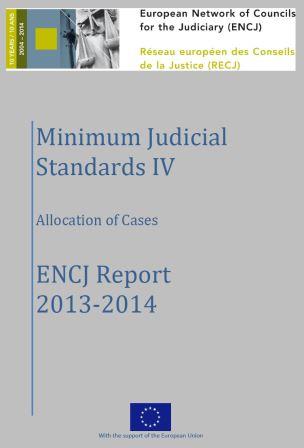Standards IV: Allocation of Cases
The success of the previous Standards projects confirmed that adoption of common / minimum standards improves the understanding among judicial authorities and different legal systems and, therefore, contributes to the reinforcement of mutual confidence and judicial cooperation as well as facilitates the attainment of a common European judicial culture.
In 2013/2014 the project developed standards in the area of allocation of cases, which is crucial for guaranteeing the independence and impartiality of the judiciary. 
The report contains 11 standards for the allocation of cases.
1. All cases should be allocated on a basis that is compatible with Article 6 ECHR.
2. There should be an established method of allocation of cases. The method of allocation should be made available to the public. This method of allocation may be governed by statute, regulation or judicial or administrative practice.
3. The method for the allocation of cases should ensure the fair and time efficient administration of Justice, and the enhancing of public confidence.
4. The following principles and criteria to be applied in the allocating of cases should be taken in to account in all established methods of allocation, including administrative or electronic allocation, and allocation by a senior judge, Presiding Judge or President of a Court.
5. The principles and criteria to be considered in the methodology for allocating cases should be objective and include:
6. When considering complexity, it may be defined as including some or all of the following factors:
7. The method of allocation should be applied uniformly according to the criteria in paragraph (5); differences in the application of the principles and criteria may be required due to the nature of the jurisdiction, the size of the Court, the level of the Court and the judicial district where the case is heard.
8. Allocation should be the responsibility of the President, Senior Judge of the Court or a Court Board, but the practical arrangements for the allocation of cases can be delegated to either another judge or a civil servant authorised for the purpose of the allocation of cases.
9. The motivation/reasoning for any derogation from the established method of allocation should be recorded.
10. The method for the allocation of cases should comply with the principles and criteria set out herein whether the Judge is sitting alone or as part of a panel. When Judges sit as a panel it is the combined composition of the panel that should comply with the principles and criteria.
11. The parties to a case are entitled to be informed about the allocation of the case at a time prior to the start of the hearing/consideration of the case that is reasonable taking into account the nature and complexity of the case, and the time by which the party has to exercise any right to challenge the allocation of the case to the specific Judge/Judges. This may be done in writing, electronically, or by the publishing of a Court list or any other means.
a) Are the parties entitled to be informed about the allocation of the case prior to the start of the hearing/consideration of the case?

